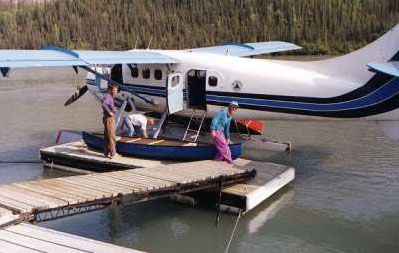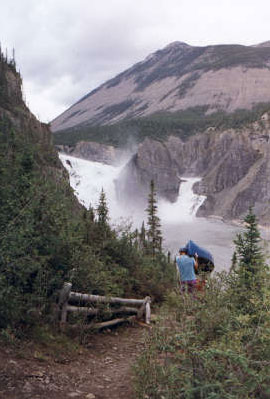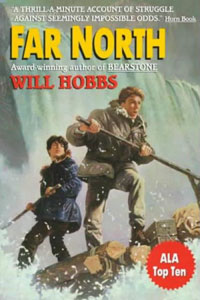 |
I had heard about an amazing river up there called the Nahanni, and my wife, Jean, and I decided we had to take our whitewater raft up there and run it. A friend joined us with his canoe. At that point I didn't even know there was going to be a story. We hired a bush pilot who flew us to the upper river in a small floatplane. It's all wilderness there, no roads. On the fourth day of our thirteen-day trip, as we were portaging around 385-foot Virginia Falls, a ranger told us about a floatplane that had stalled there earlier and nearly drifted over the falls. On the spot, I started thinking, Story!
Describe the research that went into the writing of Far North. It was anything but boring! Two road trips north, one to Canada and one to Alaska, helped immensely to collect books about the area. I ran up the phone bill too, calling librarians and native cultural centers in northern Canada. I read a shelf full of books by bush pilots, adventurers, and anthropologists, keying in especially on winter conditions and the ways of the people and the animals in winter. My greatest find was a book by native Dene elders speaking their hopes and fears for their young people's future. At last I was so full of ideas, I couldn't stand the anticipation anymore. I had to sit down and start writing. I'd glimpsed that this could be a story not only of physical survival, but of the survival of a way of life as well. What are some personal experiences you drew upon as you were writing?
I lived in Alaska when I was a kid—third through fifth grade. As I wrote Far North it was all coming back: the raw vastness of the land, the winter darkness, the northern lights. My winter experiences in Colorado, where we now live, helped as well. Twice I've snowshoed far into the back country and winter-camped at high altitude. Both times it was New Year's Eve and I experienced conditions at twenty degrees below zero. Of course I drew heavily on our summertime experiences on the Nahanni—for example our fly-in with the bush pilot and our run of Figure-of-Eight Rapid, which is the spot where Gabe and Raymond nearly lose Johnny Raven on their attempted escape down the river. I couldn't have done nearly as well writing convincing descriptions unless I'd seen that country myself and fallen in love with it. Why did you make Gabe, the narrator, a Texan? I wanted the reader to see the north through the eyes of a complete outsider who was discovering that amazing environment for the first time. Texas, I thought, is about as different from the Northwest Territories as you can get. During my high school years I'd lived in San Antonio, so I had a lot of personal background to draw on as well. What would you hope readers come away with after reading Far North? I hope they suffer a good case of virtual frostbite turning the pages. At the end, I hope they'll say to themselves, What an amazing country that is, and what amazing people they must be who've known how to live in it for thousands of years. I hope they'll appreciate the Johnny Ravens in their own lives, and remember Johnny's words, “Take care of the land, take care of yourself, take care of each other.” Note: For more info on the writing of Far North, see the Author's Note at the end of the book. |
|


